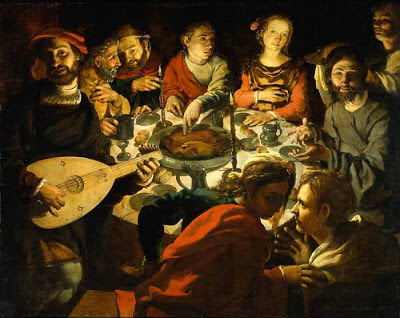NB. I'm teaching most of today at the seminary, so no preaching for me today. . .however, I couldn't let today go by w/o saying or writing something! So, here's a homily from Jan 22, 2008 for this sad day. . .
Day of Penance for Abortion’s Violence Against Human Dignity (GIRM 373)
Isa 32.15-18 and Matt 5.1-12 (Votive Lectionary nos. 887 and 891)
Fr. Philip Neri Powell, OP
St Albert the Great Priory, Irving, TX
It doesn’t take long growing up on a farm to figure out the meaning of the gospel adage: you reap what you sow. We planted melon seeds and melons grew. We planted squash seeds and squash grew. Come harvest time we reaped melons and squash. The connection between planting seed and harvesting the fruit of the seed’s plant is almost too obvious to have a name. “Natural consequence” might work. Or perhaps something less philosophical like “biological process.” Regardless of what we decide to name the connection, the connection is significant not only for planning a useful garden—imagine planting spinach seeds and getting corn two months later!—but it is also significant for us as creatures who live and grow in the image and likeness of our Creator. The seed we sow in the private plots of our own hearts and the seed we sow in the public ground of the “Common Good” will grow to fruition for harvest and that harvest will make its way back to our plates. On this day of penance for abortion’s violations of human dignity, we must ask: are we eating our own condemnation?
We
could spend most of today talking the coming financial disaster of Baby
Boomer retirement and the lack of younger workers to pay into Social
Security. We could talk about how the low
birth-rate among the Boomers turned Gen-X into Generation-Narcissist,
and Gen-Y into Generation-Entitlement. We could
point out that the “freedom of choice” to procure legal abortions and
the use of contraceptives have “freed” sex from its reproductive end and
given us at least three generations of Americans that are at once
obsessed with sex and neurotic about sex to the point of needing professional medical treatment. And
we could spend some time talking about how legal abortion has
functioned in our national moral calculus as an agent of human
degradation, one focused tightly on racial minorities and the poor. This is where we are. Where are we going to be?
The Beatitudes teach us that there is a pattern to justice and peace that begins right where we are. Where we are always results in where we will be. Just look at the text. Blessed ARE they who mourn, for they WILL BE comforted. Blessed ARE the clean of heart, for they WILL see God. All the way through the teaching, Jesus makes the practical, moral connection between where we are with where we will be. Blessed are, blessed are, blessed are. . .will inherit, will be shown mercy, will be satisfied. This is the moral parallel to our sown seed/predictable harvest image.
Fortunately, as moral creatures, we are graced with intelligence and good sense. We are free to change where we are and therefore free to alter where we will be. Isaiah says it plainly, “Justice will bring about peace; right will produce calm and security.” So
long as we sow the seeds of narcissism, entitlement,
self-righteousness, material convenience, and violence against children
and the unborn, we can expect to harvest nothing less than an aggressive
contempt for life, an aversion to sexual responsibility and care, and a
culture so soaked through with death that it stinks up the heavens. So long as we deny the justice of the most basic human right—the right to live—to our future, we have no future. There is Nothing beyond narcissism; Nothing beyond entitlement; Nothing beyond violence but more violence. We
will not be shown mercy; we will not be comforted; we will not be
called children of God, nor, for that matter, will we see God.
Our ministry today is penance. And preaching. Who out there doesn’t know that Christ’s peace follows God’s justice? No
desert will become an orchard and no orchard a forest if we cannot
quench the conflagration that consumes our yet to be born future. There is no soil rich enough to produce a harvest without seed.
* GIRM #373: “In all the dioceses of the United States of America, January 22…shall be observed as a particular day of penance for violations to the dignity of the human person committed through acts of abortion, and of prayer for the full restoration of the legal guarantee of the right to life. The Mass 'For Peace and Justice' (no. 21 of the "Masses for Various Needs") should be celebrated with violet vestments.”
_____________Follow HancAquam or Subscribe ----->
















